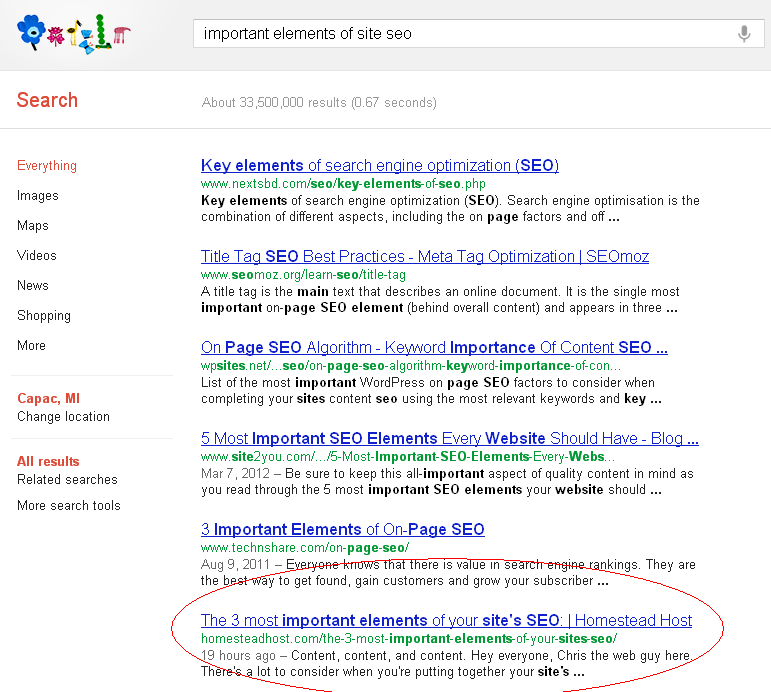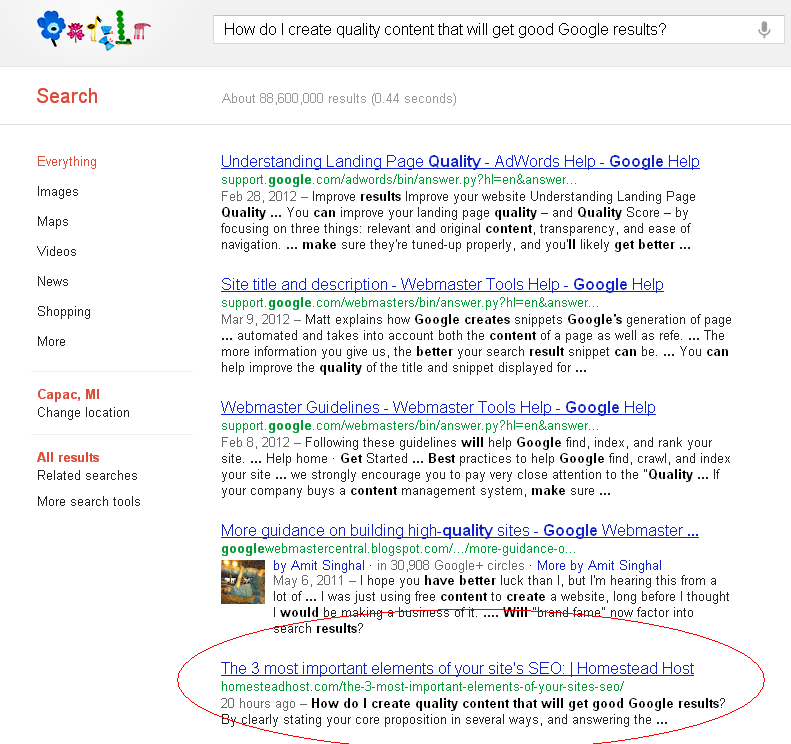The 3 most important elements of your site’s SEO:
Content, content, and content.
 Hey everyone, Chris the web guy here. There’s a lot to consider when you’re putting together your site’s marketing strategy, and you’re going to hear (and probably have heard) a bajillion tips already. Good. Listen to them, digest them, and when it comes to the best practice stuff like proper markup, make sure you follow them. However, none of that is going to do you a bit of good if your content is poorly written or stale. In fact, it may just hurt you: Google has recently announced an “Over Optimization Penalty” for folks who focus more on SEO than giving users what they’re searching for.
Hey everyone, Chris the web guy here. There’s a lot to consider when you’re putting together your site’s marketing strategy, and you’re going to hear (and probably have heard) a bajillion tips already. Good. Listen to them, digest them, and when it comes to the best practice stuff like proper markup, make sure you follow them. However, none of that is going to do you a bit of good if your content is poorly written or stale. In fact, it may just hurt you: Google has recently announced an “Over Optimization Penalty” for folks who focus more on SEO than giving users what they’re searching for.
So, how do we make good content that will place well in Google’s new enhanced search algorithm?
Forget keywords; think key phrases and synonyms.
Google advised a long time ago that the meta keywords tag is not even processed by their crawlers. If you haven’t shifted away from a keywords approach yet, you’re already behind in the game. With their push to enhance synonym results for search, the total context of your posts becomes ever more important. Make a clear statement in your opening paragraph, and restate it before you close your piece, in slightly different language.
Creating quality content is more important to your Google SEO than stuffing your post full of keywords and tags.
Another important part of keyphrasing is answering questions. It’s a common practice in semantic search these days to type out the search query in the form of a question. This article gives you some quick tips on how to see what questions people are asking to get to your site. Given that knowledge, use their questions in your post, and answer them.
How do I create quality content that will get good Google results? By clearly stating your core proposition in several ways, and answering the question searchers are asking.
Don’t sell; educate.
Whether you have a product, a service, or just a simple blog tracking your non-profit organic chicken farm’s egg production, people do not come to your website for advertising. They come for information. If your posts and page content gives them the information they’re seeking, you already have a customer, whether there’s any transaction right that second or not. What’s more, the more comprehensive your site’s information is, the more valuable a resource Google thinks it is for answering similar questions. There are a couple of things your site should have no matter what:
- An FAQ – Seriously, unless you simply have never answered a question in conjunction with your site, product, or service, this is a critical need. Google is attempting to provide straight up definition results as often as possible, and an FAQ can both answer the question as noted above, but also be included in their definition responses.
- Guides, Tips, and Tricks – Cracked.com has mastered the simple list format; a quick look through their archive shows hundreds of articles such as “The 5 things that might kill you but won’t because they’re old wives tales except they’re actually true and you’re really going to die.”, or something like that. As simple and cliche as that formula is, it works really well because it promises the reader both interesting information, in a concise and digestible amount. Once again, these pages answer questions, which draws both click-through, and higher ranking.
- A Blog – I almost didn’t include it, because it really should be common sense at this point. No matter what type of business you have, nothing is going to give you better results for everything we’ve discussed here, plus keep your freshness rating with Google high. (Pro-tip: freshness is really, really important to Google). If your site is simply a show case for your product, and you’re not turning over high volume a la MegaConglomerateCorp.com, stale pages are a fast track to page 100. Some SEO Cowboys (along with actually useful people) suggest that if you have posts older than two years, it’s beneficial to use 301 redirects to point to more current posts on the same topic.
Every site will have some intuitive section where useful information can be presented on a regular basis, whether it’s one of the options above, an “Ask the Expert” category, or simply a well curated collection of technical documentation which is frequently updated. If you don’t already have it, figure out where it should be on your site, and add it.
Google+
 Like it or not, G+ is Google’s baby, and it’s here to stay. What’s more, links which have been “+1’ed” will begin to rank more highly than links without it. Currently, anyone who has a Google account will see that their logged in searches now show a “personal” results section with content that has been highlighted on Google+. Even if you won’t use the service on a personal level, create a Brand+ page for your site, and share every piece of content you publish there. Building even a small group of followers on G+ can have a substantial effect on your search results, and you can now directly observe the impact +1’s are having on your results in your Google Webmaster Tools dashboard. With such a clear tool to personally impact your search results in a meaningful way, you’re shooting yourself in the foot if you don’t use it.
Like it or not, G+ is Google’s baby, and it’s here to stay. What’s more, links which have been “+1’ed” will begin to rank more highly than links without it. Currently, anyone who has a Google account will see that their logged in searches now show a “personal” results section with content that has been highlighted on Google+. Even if you won’t use the service on a personal level, create a Brand+ page for your site, and share every piece of content you publish there. Building even a small group of followers on G+ can have a substantial effect on your search results, and you can now directly observe the impact +1’s are having on your results in your Google Webmaster Tools dashboard. With such a clear tool to personally impact your search results in a meaningful way, you’re shooting yourself in the foot if you don’t use it.
So, ok, the opening title was trite and cliched, but you still came out with three important tips to optimize your site’s content for Google.
See what I did there?
Edit, one day after this post went live:
Howdy guys, Erin here.
To show you Mr. Jenkins really knows his stuff, here’s a screenshot of this post on Google’s front page search results this afternoon:

Number 6 out of 33.5 million results? Not too shabby!
We’re also on the front page for the following search result:

Number 5 out of 88.6 million results. Seriously, folks; don’t hire an “SEO Expert” like the dude in the hat at the top – you don’t need him. Just follow some quality, free advice like this, and your SEO will be fat and happy.
10 thoughts on “The 3 most important elements of your site’s SEO:”
Leave a Reply to Host Admin Cancel reply

Super, super helpful post! I really needed to hear this info- I’ve been focusing too much on the old keyword thingie and also shunning Google+. Whoops. Gonna be putting these tips into practice ASAP!!!
My pleasure, Jill, and glad you like! You can find all of the Homestead team on G+ when you join up…we promise to help make it interesting. 😀
I’m so happy it’s useful, Jill, woohoo! And yes indeed – we can certainly help make things fun for you on G+. 😀
I am sure the keywords are important but our content should never look ridiculous and keyword organized. I think the Google likes natural websites and it’s the main secret!
That’s exactly the point, Alex. Thanks for commenting!
Absolutely true, Alex! Human-readable is key.
Great stuff.
I too need to learn more about Google + – I’ll take all the tips you have!
Can’t say I’ll have time to do it all, but I’d love it.
Adrienne, I’d be happy to help you learn the basics of G+! Y’know, sometime when we’re both not swamped. 😉
Great info article! I’ll take all the tips with me 🙂